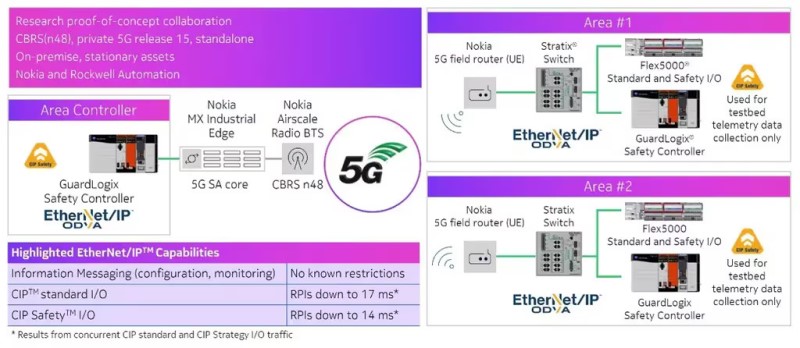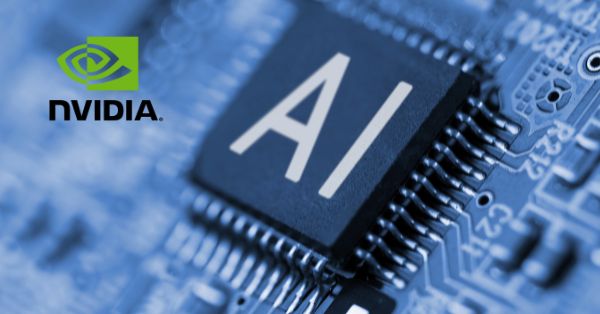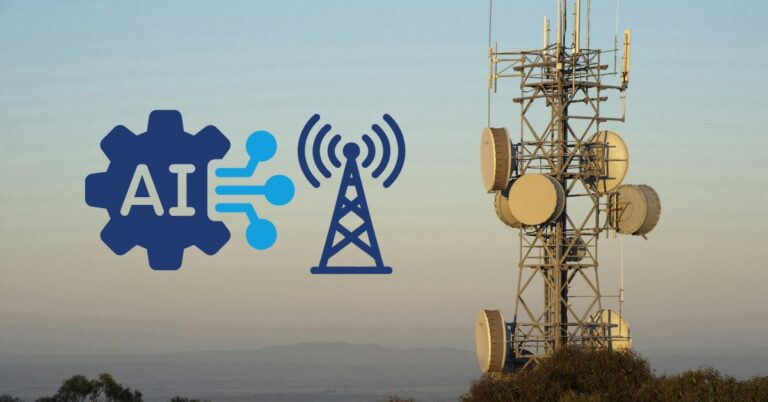Nokia and Rockwell Automation Drive Digital Transformation with Private 5G
Nokia’s partnership with Rockwell Automation marks a pivotal step toward the digital transformation of industrial networks through private 5G networks. Together, they aim to enhance industrial connectivity, improve operational efficiency, and increase network customization and security. Combining Rockwell’s industrial automation expertise with Nokia’s cutting-edge wireless technologies supports the deployment of emerging solutions such as the Industrial Internet of Things (IIoT), augmented reality (AR), and artificial intelligence (AI). This capability is essential for industries aiming to innovate and stay competitive in a rapidly evolving market.
Challenges of Deploying Private 5G for Industrial Connectivity
One of the main focuses of Nokia and Rockwell Automation is the use of licensed or lightly licensed spectrum to achieve reliable, high-performance private networks. In the United States, the Citizens Broadband Radio Service (CBRS) provides 150 MHz of lightly licensed spectrum for private LTE and 5G networks. This spectrum can be requested in 10 MHz increments, and up to 20 MHz can be purchased through Priority Access Licenses (PALs).
Industries face the challenge of ensuring seamless connectivity for their automation systems, as traditional wireless options like Wi-Fi often fall short in terms of coverage and reliability. As more companies show trust in 5G, the shift to 5G standalone (SA) networks is becoming a key priority.
Nokia and Rockwell’s Private 5G Solution for Seamless Industrial Automation
Nokia and Rockwell Automation have developed a solution that leverages CBRS spectrum to enable real-time industrial control using EtherNet/IP™ protocols. By combining Nokia’s robust 4G LTE and 5G technologies with Rockwell’s expertise, they deliver high-speed, reliable connectivity for industrial automation. This setup supports multiple automation devices behind a single wireless router, eliminating the need for complex tunneling or extra equipment typically required for industrial Ethernet protocols.
The integration of these technologies enables real-time data collection, advanced analytics, and greater automation, which improves operational efficiency, reduces downtime, and ensures secure and reliable communication for critical industrial applications.

Real-World 5G Testbed Validates Industrial Connectivity Success
The partnership’s testbed successfully validated low latency and jitter in a real-world industrial 5G environment. Utilizing Nokia’s AirScale baseband unit (BBU), two AirScale radio units (RUs), and the MX Industrial Edge (MXIE) server, the solution supported EtherNet/IP standard and safety I/O communications.
What makes this setup particularly attractive is its ease of deployment—aside from basic IP address assignment and network configuration, no special tuning was required. This demonstrates that Nokia’s private 5G solution is highly adaptable, allowing industries to quickly integrate 5G standalone (SA) networks into their existing infrastructure without complexity.
How CBRS Spectrum Powers Cost-Effective Private 5G Networks
CBRS spectrum provides U.S.-based industries with a cost-effective solution for private cellular networks, ensuring interference-free operation and maintaining performance for critical automation equipment. Using SIM-based authentication, managing devices on the network is simpler, and data stays on-site, ensuring security and low latency.
Standalone 5G networks, operating without legacy LTE infrastructure, further reduce costs and complexity, enabling faster, more reliable connections. For industrial applications requiring both LTE and 5G, LTE can also be integrated with 5G SA networks.
Key Benefits of Private 5G in Industrial Automation
Key benefits of this partnership include:
- Enhanced coverage: Up to 10 times wider coverage than Wi-Fi, ensuring reliable indoor and outdoor performance.
- Improved mobility: Seamless device handovers for uninterrupted communication.
- Simplified device management: SIM-based authentication streamlines network operations.
- Faster handover times and reduced latency: Critical for mobile assets like Automated Guided Vehicles (AGVs) and Autonomous Mobile Robots (AMRs).
How Private 5G Networks Are Transforming Industrial Operations
Industries across sectors will benefit from this collaboration by adopting private 5G networks for enhanced automation, real-time data insights, and operational efficiency. The low-latency, high-speed connectivity provided by 5G enables edge computing for AI and machine learning (ML) applications, transforming industrial processes.
The use cases for 5G SA networks in industries are vast, including:
- Edge-to-cloud connectivity: Reliable, real-time data transmission for advanced analytics and AI.
- Connected worker applications: 5G’s bandwidth enables mobile tools such as AR and digital twins.
- Mobile asset applications: Fast handover times and reduced latency support autonomous robotics and AGVs.
- Untethered stationary industrial assets: 5G eliminates the need for wired connections, increasing operational agility.
Nokia’s Role in Revolutionizing Industrial Networks with 5G
Nokia is a leader in providing innovative 5G solutions that address industrial needs. Their portfolio includes the AirScale radio access network (RAN) and MX Industrial Edge platform, ensuring that industries can quickly deploy private 5G networks to improve operational efficiency. Nokia’s global experience in deploying private networks across various industries makes it a trusted partner for industrial transformation.
Rockwell Automation’s Expertise in Industrial Automation Solutions
Rockwell Automation brings its deep expertise in industrial automation solutions, helping industries implement connected, automated environments. By partnering with Nokia, Rockwell Automation ensures its customers have access to secure, reliable wireless networks that support real-time control and data collection for optimized performance.
Private 5G Solutions Ready for Industrial Deployment
The testbed validation is already completed, demonstrating that private 5G SA solutions are ready for industrial deployment. As the partnership continues, the focus will be on scaling these solutions across industries in the U.S. and globally, leveraging the performance benefits of both CBRS and licensed spectrum.
Industry Endorsements for Nokia and Rockwell’s 5G Collaboration
Nokia and Rockwell Automation’s collaboration is widely seen as a benchmark for what’s possible in the world of industrial transformation. Their success in deploying 5G SA networks is gaining recognition among enterprises across North America, with many already benefiting from the seamless integration of industrial automation and private wireless technology.








































